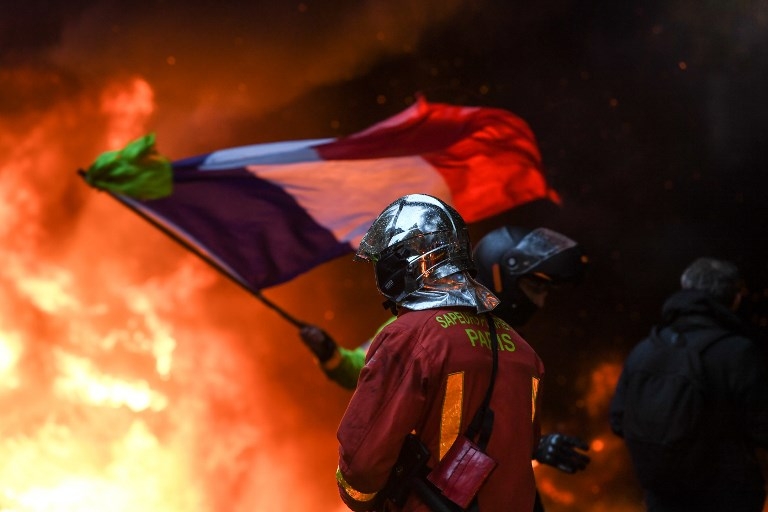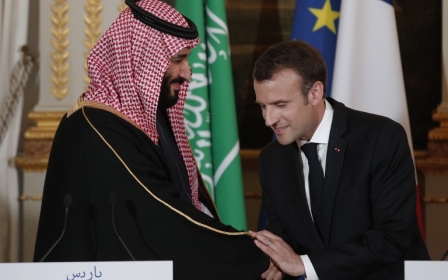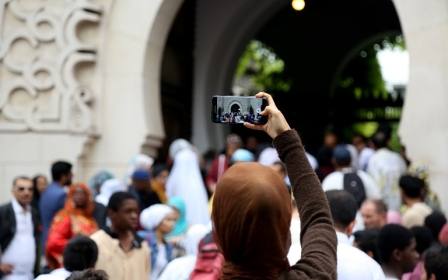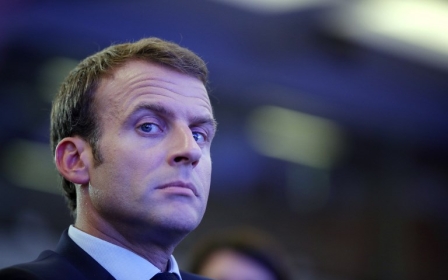The 'gilet jaunes' are uniting France in a rage against Macron's regime

The walls of historical landmarks across Paris are emblazoned with the slogan: "The people demand the fall of the regime."
In recent weeks, thousands of people wearing yellow vests have taken to the streets in cities across France. Initially, the demonstrations erupted over rising fuel prices; now, the movement has grown into a mass anti-government protest, reminding President Emmanuel Macron that the people will hold his leadership to account.
An estimated 300,000 people took to the streets on 17 November when this all began. It has been described as the biggest uprising in the country since the 2005 riots that rocked the nation for weeks after two teenage boys - Zyed Benna and Bouna Traore - were fatally electrocuted while being chased by police.
On Wednesday, the French government abandoned planned fuel tax increases, a week after French Prime Minister Edouard Philippe ruling this out in a televised address to the nation.
Leaderless protests
The yellow-vest movement is reflecting badly on the president, who is facing calls for his resignation from protesters and political opponents. What has taken pundits by surprise, however, is the apparent coalition of all those involved.
It is seen as a leaderless wave of protests, but various groups have joined and rallied diverse communities to bring their collective power onto the streets. In the lead-up to the third Saturday of demonstrations, the trade union CGT, along with campaign groups such as the Justice for Adama collective against police brutality and Banlieues Respect, a federation of associations from the marginalised suburbs, sent a rallying cry across social media.
Macron seems set on dividing those involved, stressing the difference between peaceful protesters and those accused of violence
Communities of colour, migrants and Muslims were initially hesitant to publicly join the protests, given that supporters included the far-right Rassemblement National and figures such as Marine Le Pen and Frank Buhler. However, as the movement gained ground, the demands strongly resembled those of working-class neighbourhoods in the banlieues: combatting mass unemployment, reducing living costs and providing decent housing for all.
Nevertheless, Macron seems set on dividing those involved, stressing the difference between peaceful protesters and those accused of violence. On Saturday, as state forces urged him to call a national state of emergency, he stressed that: "Those guilty of this violence don't want change, they don't want improvements; they want chaos. They betray the causes that they pretend to serve and which they manipulate."
Tackling climate change
It is ironic that he has condemned violence, while riot police have been firing tear gas, stun grenades and water cannon at protesters. Hundreds of people have also been arrested - yet most mainstream media coverage has focused on the burning cars, or the bins and benches that have been ripped out.
Little is being said about Macron's actions in the lead-up to this uprising, which is about much more than his attempts to reduce global warming. The suggestion that it is all about the cost of petrol, which protesters wish to continue frivolously using for a lesser price, is deeply problematic and untrue. Those truly destroying this earth look and act a lot like Macron, wearing expensive suits, shaking hands with others in power, and making deals to enrich themselves at the cost of the masses.
It would be false and dangerous to label these protests as hostile towards combating climate change. The yellow vests have pointed out the gaping holes in France's climate-change agenda. Macron's government is too busy letting the real destroyers of our planet off the hook while reprimanding the poor. His political base, big business, is allowed to continue as before, while the rest of society is made to pay dearly for problems not of their making.
How will it land?
It wasn't that long ago that Macron was elected selling his vision of a non-partisan, "radical centrist," unified France. Since then, his relentless war on the poor, trade unions, migrants, Muslims and the welfare state have shown the real face of the banker-turned-president.
The explosion of anger and frustration across French society captures this reality in a striking way. Scenes of railway workers - on strike against government attacks on their working conditions - being greeted by chanting crowds of yellow-vest protesters was a perfect symbol of this new, militant unity.
When Macron returned from the G20 summit in Argentina on Sunday, he went straight to the Arc de Triomphe to see the damage caused. Graffiti all over the monument read: "We've chopped off heads for less than this" and "Topple the bourgeoisie".
To paraphrase a line from Hubert Kounde in the famous film La Haine, which deals with post-riot life in the Paris ghettos in the 1990s: "It's a story about a society on its way down. And as it falls, it keeps telling itself: 'So far so good ... So far so good ... So far so good'." But - as Hubert also tells us - it's not how you fall that matters. It's how you land.
- Malia Bouattia is an activist, the former president of the National Union of Students, co-founder of the Students not Suspects/Educators not Informants Network and presenter/panellist on British Muslim TV’s Women Like Us.
The views expressed in this article belong to the author and do not necessarily reflect the editorial policy of Middle East Eye.
Photo: A French firefighter walks towards flames as a demonstrator waves the French flag in Paris on 1 December (AFP)
Stay informed with MEE's newsletters
Sign up to get the latest alerts, insights and analysis, starting with Turkey Unpacked
Middle East Eye delivers independent and unrivalled coverage and analysis of the Middle East, North Africa and beyond. To learn more about republishing this content and the associated fees, please fill out this form. More about MEE can be found here.






